Living In Thailand Blog
Monday 22nd March 2010
On The Road - Phetburi to Bangkok
I have decided not to stay in Phetburi any longer. If I stayed today I would only do the same things I did yesterday.
Yesterday, when I asked what there was to see, I was just given a list of temples. They're very attractive but unless you have an academic interest in temples, you can only see so many before it starts to get a bit repetitive.
I considered visiting another provincial town but I don't imagine anywhere else will be much different. The beach resorts of Cha-Am and Hua Hin are near but they will be full of farangs wearing rubber flip-flops and beachwear, and I'm just not interested.
It's been four years since I visited Bangkok so that's where I'm heading for. The capital drives me crazy but there's a lot to see and do, as well as good eating and shopping.
I've been on a few very scenic road trips in Thailand but the journey from Phetburi to Bangkok has to be one of the ugliest stretches of road in the country. It's a purely industrial landscape with nothing, apart from ugly buildings, huge billboards and electricity cables.
The driving style is normal. The minivan driver puts his foot to the floor and for most of the way we travel at 150kph. If he sees a slower vehicle in front he just roars up behind flashing his lights. If the car in front doesn't move over, he weaves in and out of all three lanes to overtake.
As we approach Bangkok we meet one of the capital's famous traffic jams. I notice that most of the cars have dents in their panels or missing bodywork.
The scenery doesn't get any better. However, I have to admit that there is something exciting about arriving in Bangkok. Compared to anywhere else in the country, it is huge, and it is also a mass of humanity.
I booked a hotel before I left Phetburi. I don't usually bother in Thailand but Bangkok is hot, overwhelming, and disorientating. There are also lots of bad Thais in Bangkok who make a living cheating foreigners. It is best to have somewhere booked and go straight to the security of a hotel.
Apparently there has been a recession, and apparently tourists were cancelling their trips because of the red-shirt problems. It's hard to imagine though, because there are farangs everywhere.
It's easy now to pick out the tourists from the expats. The tourists look completely lost, while the expats walk with an arrogant air around as if they own the place.
The tuk-tuk drivers can also pick out the tourists quite easily. They call tourists 'boss', as in, "Taxi boss?"
Quite a few male farangs are walking around with Thai girls who might as well have big signs over their heads saying 'bar girl'.
You read so many stories about male foreigners having problems with Thai girls but when you see the kind of girls they choose it is hardly surprising. I could understand if the girls were attractive, but they aren't attractive at all - just trouble.
After checking in to my hotel, I go to buy something I need that I can't buy in the provinces. My hotel was quite expensive (Bt1,300) but with so many tourists, Bangkok hotels can charge almost what they want.
There is no Wi-Fi in the hotel, which I find quite surprising. Most provincial hotels have this now so I expected everywhere in Bangkok to have it. I spend quite a bit of time looking for a coffee shop with Wi-Fi.
My memory must be going because an experience at Starbucks reminds me that exactly the same thing happened in Chiang Mai last year.
Around where I live, all coffee shops offer free Wi-Fi. It's cheap these days and it brings customers in.
Starbucks charge a lot for their coffee and the least they could do is provide free Wi-Fi. Instead, they charge for it at the ridiculous rate of Bt150 an hour. You can get an Internet connection for Bt500 a month or less, so Starbucks is having a laugh.
I find a relaxed little ice cream and coffee shop where the Wi-Fi service is free, as it should be.
My plan the next few days is to get some photos, eat some good food, and maybe buy some more things before heading back.
My girlfriend isn't at all impressed with me going on this trip and I have promised to take her on a trip on the 29th to an area of natural beauty with wetlands, lotus flowers, and lots of birds. It should be a little more relaxing than crazy Bangkok.
I find that I can never relax in Bangkok. I get the impression it is full of opportunists and wannabees. Some people come to make money in an honest way, but my instincts tell me that there are a lot of people who can't be trusted - both Thais and foreigners.
I need to do some stuff here but already I am thinking about getting back home to the south. To be honest, I haven't really enjoyed my last few trips in Thailand. I always look forward to travelling but after a couple of days I've normally had enough.
Sunday 21st March 2010
On The Road - Phetburi
The hotel is OK but definitely nothing special. Because of the room situation last night, I was forced to pay Bt1,000 because they told me the last remaining room was a 'special room' ( hong pi-set).
It's actually quite a large room, not that I wanted or needed a large room. As usual with Thai hotels, everything in the room looks quite well used.
The folder in the room still makes a point of listing the contents of the room, along with prices. This is so that if anything gets broken (or goes missing), they know how much to charge you.
What makes me laugh is that they always pretend they do this in case you want to buy something. "Please contact reception if you want something from the hotel to keep as a souvenir."
Yeah sure. I think I'll ask to purchase the TV remote control (Bt300), the ashtray (Bt150), and a clothes hanger (Bt200) as souvenirs just to see what their reaction is.
I'm writing this offline but I'm not sure when I will be able to upload anything. The hotel has Wi-Fi but it isn't working.
I spent about five minutes on the phone trying to understand what the guy on reception was telling me when I asked for the password. When I finally understood, he told me there was a problem (mee bpun-haa). Why couldn't he just have told me that in the first place? Well, I did ask him for the password, didn't I?
As soon as you get away from the tourist areas, the English ability of Thais dries up. I like it because it gives me a chance to practice my speaking and listening.
You find that in the tourist areas there are lots of Thais who want to speak English. If you speak Thai, they reply in English (even though you may not understand English). I think it's about losing 'face' again.
Sometimes conversations can go on for quite a long time with each person speaking the other person's language. The contest ends when one can't understand something and has to revert to his/her native language. Quite amusing!
Thais always assume that white Caucasian farangs speak English, and they will speak English to them (if they can speak English). There must be quite a few foreigners in Thailand who look roughly the same but who can't speak a word of English.
Sometimes, when they do this to me, I feel like telling them in Thai that I'm Russian or something and can't understand English.
I was up at just after 5am this morning and out of the door by 6am. Phetburi is quiet and very clean. There is hardly a piece of rubbish anywhere - with one exception that I will explain in a moment.
The streets are wide and there are lots of well-tended temples. It really feels like Buddhist Thailand here. That may sound a strange thing to say but in the deep south of Thailand it isn't the same.
The main religions in Hat Yai are money, commerce and business. In addition, the three dominantly Muslim provinces are next door and Islam is ever-present.
There are lots of Chinese-Malaysian and Chinese-Singaporean tourists, and at times it feels like being in China because all I hear is Chinese.
In Phetburi this morning there were lots of monks doing their alms rounds and lots of locals making merit by providing alms. I wandered around a Thai street market, the kind that can be found everywhere in Thailand. It felt very, very Thai.
On the bus coming up, I called my little sister and told her where I was going. She remarked that there would be lots of monkeys. I thought she had misheard me, thinking I had said Lopburi instead of Phetburi. She said no, and that Phetburi also had lots of monkeys.
As I headed out this morning before sunrise there was the usual army of stray dogs wandering around the streets. A bit further on, I saw an animal that was smaller than a dog but it didn't move like a cat. As I got closer I saw it was a monkey.
There are hundreds of them. Thais feed them as a way of making merit, and the monkeys have now made a connections between humans and food. When they see a person, they approach, hoping you have some bananas or something.
Their antics are amusing but I can never trust a monkey. I am always on my guard against them stealing something or attacking me. I was bitten once and I don't want to be bitten again.
I said earlier that Phetburi was very clean but I passed an area with rubbish strewn all over the sidewalk where a gang of monkeys where scavenging through the bins for food.
My farang count is now up to one after seeing a guy jogging. There are some Thai tourists from Bangkok but not many. The tourist infrastructure here seems almost non-existent. I looked for some alternative accommodation but I could only find four hotels and one guesthouse in total.
The breakfast at the one I'm staying at is very good and now they have some ordinary rooms available so I will probably stay here but move from my 'special' room.
No photos at the moment because I'm back to using a DSLR on this trip and shooting RAW files that I can't process on the road because the screen resolution on my netbook doesn't meet the minimum requirements for Adobe Camera RAW.
I will sort out photos once I'm back home.
Warning - Angry moment coming up
It didn't take long to get into my first argument. Near my hotel there is a sign for a cable car. When I went along it was actually a funicular railway. I checked for dual-pricing by reading the English and Thai, and saw it was the same - Bt40. Good.
I climbed aboard and went to the top of the hill. At the top there was a ticket booth, and without a ticket you could go no further.
The first thing I saw was a large sign in English, "Admission fee for historical monument and national museum 150 Baht."
Of course, there was nothing about this being a special price for foreigners and I suspect that 99.999% of foreign tourists simply think this is the price that everyone pays.
However, immediately under this notice was another notice in Thai saying that Thais pay Bt20. Just to make sure that foreigners don't have a clue what's going on, the numbers are in Thai. This is what happens in many places.
I decided to take the woman selling tickets to task. I started off explaining that I have lived here for over six years, I work here, and I pay taxes. She asked for my Thai ID card that of course I don't have.
She then asked for my work permit, which I do have but didn't bring with me.
I lost my temper and launched into a bit of tirade. I know full well that this approach doesn't work with Thais but the objective was to let off some steam.
As I was waiting around, a couple of French tourists showed up led by two Thais. They all paid and their guide explained it is cheaper for Thais because Thais pay taxes.
This remark was akin to showing a red flag to a bull. I then launched into a tirade at him because even though I pay taxes but I am still expected to pay the "raa-kaa farang".
This was all in Thai and he explained to the French tourists that I was complaining. I then explained to them in English, only for the stupid woman to say she agreed and that Thais should pay less. At this, I had to leave before I hit someone.
She was typical of ignorant tourists that show up in Thailand and think that all Thais are really sweet people who are all desperately poor. Yes, a lot are poor but there is a huge amount of wealth in this country. Just look around.
I've made the point before that the rich Bangkok family who turn up in a Bt10 million Benz pay just Bt20 each, but the struggling farang kee-nok backpackers still have to pay Bt150. You can't means-test people based purely on their nationality.
If Thais insist on doing this, it would be quite fair for other countries to have a special Thai price. I would fully back my government if they wanted to do this. Let Thais pay seven-and-half times more than locals to get into London attractions.
The Thai middle class is getting gradually bigger, and more Thais are travelling abroad these days. If what I suggest was to happen, I wonder how Thais would like it? I have a feeling that their dual-pricing system might get abandoned quite quickly.
I've heard other farangs try to defend this policy but it is indefensible. It is racist and completely unfair.
I walked away today and I will continue to walk away when this happens. Sometimes I manage to get the local price but not today. The money doesn't make any difference to me but it is a matter of principle.
Thais know this is wrong. If they weren't ashamed, they wouldn't go to such great lengths making sure the information about prices for Thais was written in such a way as to be unintelligible to the vast majority of farangs.
Dual-pricing in Thailand.
Straight after the bad moment, I had a really great moment. I stopped for a drink and the young girl who was serving tried to speak to me in English. Her English wasn't good but that doesn't matter. What's important is that she tried. She was only 10 and it was really sweet.
I couldn't understand what she was trying to ask me so told her ask me in Thai and then explained how to ask the question in English.
As a teacher in Thailand (who pays taxes), one of the biggest problems you face with Thai students is a complete lack of confidence (mai glaa). They're terrified to speak in case they make mistakes. Their solution, most of the time, is simply not to speak.
I always tell them not to be afraid of speaking incorrectly, but to keep trying. If they never speak, they won't make mistakes, but they won't learn either.
It is very rare that a young Thai kid will voluntarily attempt to speak English, and when they do you know it has taken a lot of courage.
I held her hand, told her in Thai not to be afraid, and coaxed some more English out of her. What a lovely kid. I could have cried.
Phetburi has a lot of attractive temples, and for foreigners it is an authentic Thai experience (unlike many of the tourist resorts). There is a cave that has been turned into a Buddhist shrine a little way out of town (that I probably won't visit) and a very large reclining Buddha image that I did visit.
It's a pleasant enough place but I was hoping for a little more. After living here for almost six-and-a-half years there isn't really anything that I haven't seen before.
At this rate, I think I will end up in Bangkok fairly soon. After that, I'm not sure if I will go somewhere else or just go back home.
Dusk arrives at around 6pm in Thailand. At around 4pm today I wanted to make the most of the remaining light to get some photos. The softer light at the end of the day when the sun is lower in the sky is better for photography.
I wasn't sure where to go so asked the advice of some tuk-tuk drivers. One guy pulled out a postcard of a nice looking palace building. I asked how long it would take to get there but they said they weren't sure because of the traffic.
I asked how long approximately and they said an hour. I didn't want to spend an hour each way in a tuk-tuk so said I wasn't interested. They said that if they hurried we could get there in 15 minutes. Mmmm, you can cut the journey time by 75%, can you? Something smelled fishy.
We agreed on a price of Bt200 for one of them to take me there, wait while I took photos, and then bring me back.
We set off at a very leisurely pace with me not knowing how long it would take. We arrived after 10 minutes. I had a word with the driver, telling him the price was based on a much longer journey and that Bt200 was too much.
He told me Thais say that farangs are kee-niaow (stingy).
Great. Foreigners get ripped off officially at museums, national parks, national monuments, etc., because of the dual-pricing system. They are then ripped off unofficially by anyone who thinks they can charge a foreigner more than the usual price.
When you question any of this you find there is no recourse, or you are told you are stingy. You can't win.
The good news is that these problems disappear once you start living in Thailand. You soon find out how much things should cost, and the cheapest way to get around.
It's only when you are in unfamiliar territory that you start to have problems. I'm pretty good normally at avoiding problems, and being able to converse in Thai to some extent helps a great deal.
However, when someone tells you an outright lie there is little that can be done. Had this place genuinely been an hour away, Bt200 was a good price, but I had no idea it was only an easy 10 minute drive away.
I spent about 25 minutes taking photos and ended up giving the driver Bt140. He knew what he was trying to do, and he knew the amount I gave him was plenty enough.
A lot of Thais do back-breaking work during the hottest part of the day in the rice fields and on construction sites for Bt150 a day. The ones that prey on tourists to make a living lead relatively easy lives.
Saturday 20th March 2010
On The Road - Hat Yai to Phetburi
My teaching commitments finished last Monday. I spent a few days sorting stuff out and now I'm ready to travel a little. I'm writing this while sitting on a bus heading up the peninsula.
Foreigners in Thailand normally head off to a beach somewhere in their free time, but beaches and islands full of farangs are not my cup of tea. I have no interest in such places at all, even though there are many located fairly near to where I live.
My original plan was to spend a week in Bangkok but I have been there many times, I know exactly what it's like, and I'm not sure that I can face Bangkok. Maybe this is a sign of getting old?
Mountains, lakes and rice fields are much more to my liking. Previous trips to Sangkhlaburi in Kanchanaburi province and to Chiang Rai were good in this respect.
I also enjoy provincial cities. I had a couple in mind further north but I was told recently that Phetburi is an attractive and interesting place. It's close to Bangkok and I may take a day trip into the capital while I'm there.
If my plans to stop working next year go ahead (which I'm pretty certain they will), I may also be moving my location in Thailand. In addition to travelling for the normal reasons, I am also using my trips around Thailand to search for a new place to live. I'm looking forward to this trip.
Regarding travel in Thailand right now, there is a problem with smog in the north at the moment. I've seen some photos, and a Malaysian correspondent who visits Thailand frequently sent me a message from Chiang Mai yesterday saying it was pretty bad.
I understand that this annual problem is caused by slash-and-burn agricultural practices.
As usual I am travelling light. I have a few changes of clothes and a map of Thailand. Travelling around weighed down with loads of bags just spoils the experience.
I often see foreigners with huge backpacks full of gear, but all you need is essential items. Almost everything can be bought in Thailand and getting clothes laundered is cheap and easy.
My preferred style of travel is not to research everything to death and then travel with a list of things to be ticked off. I prefer just to go with an open mind, take things at a leisurely pace, and find out things for myself.
It is so easy to find places to stay and eat at in Thailand that you really don't need a guide. It's also very easy to find out which places are worth visiting.
When it comes to avoiding rip-offs, I can tell when Thais are trying to rip me off. Having a guide book won't help you, but talking back to the rip-off merchants in Thai will.
I could have flown to Bangkok but I chose to take the bus instead. It takes a bit longer overall but I'm in no hurry. It's cheaper and a lot less hassle than flying.
The bus I'm on is a VIP type with 24 seats. Fortunately, I bought my ticket last night. Most buses leave later in the day and there are only two that leave in the morning. As I was waiting this morning an Asian tourist appeared but was turned away because there were no seats left.
The seats on the bus have a massage function. It's not quite the same as being massaged by a 20 year-old girl from Chiang Mai, but it beats a cramped budget airline seat.
I've never been on a bus that has massage seats before. The experience is strange. It feels like sitting on a vibrator - not that I've ever sat on a vibrator but, if I did, I'm sure this is what it would feel like.
I have never managed to figure out certain things in Amazing Thailand, and included in that list of mysteries is seat allocation on buses.
If you buy a ticket where the bus leaves from, you are assigned a seat. If you try to sit somewhere else, they get upset. However, if you board the bus en route you can sit wherever you like.
In the past I have been told that I can't sit in a certain seat, only for someone to board the bus a few minutes later and sit where I wanted to sit with no problems.
My ticket today was for seat 3C. When I got on the bus I was asked for my ticket and told where to sit because there are no numbers on the seats. I was told to sit in the middle seat in the fourth row so it has to be 4B, not 3C.
While travelling by road I like to look at the surroundings. However, Thais are different. While travelling they like to sleep. Almost as soon as the bus left, an instruction was given to close all the curtains.
Thais associate travelling with sleep. They also associate rainy weather with sleep; and quite a few of my students associate my English lessons with sleep. In fact, there aren't many activities that Thais don't associate with sleep. It's a national pastime.
The air-conditioning is blasting out cold air and the Thais are wrapped in blankets sound asleep. I am just about to stop typing and head for a vacant seat near the window but I am pretty sure that the bus lady will order me straight back to where she told me to sit earlier.
As there are three seats in each row, I figure that seat 3C should be a window seat anyway, but it is useless arguing with Thais. It doesn't matter how logical your argument might be, if you try to argue they will simply ignore you. I guess this is about losing face.
After arriving around 7pm, the first hotel I tried was full, and the second only had one room left. I had forgotten it was a Saturday night. Bangkok isn't far away and the hotel has a special weekend offer, so Bangkokians are using their coupons to get a cheap night away from home.
There is also a film crew staying at the hotel. On reception was a list of everyone involved, with their titles and room numbers.
The hotel is full of ladyboys, who I guess are involved with the filming. My philosophy is live-and-let-live but I can't help finding them a little strange.
They are all obviously men but they prance around as if they were the world's most beautiful women. The problem is that everything about them is too much.
They are too tall, their hands and feet are too big, their mannerisms are far too exaggerated, and - where they have had breast implants - these tend to be oversized.
They obviously feel proud of their new breasts and display more cleavage in public than a respectable Thai girl would ever do.
That was one sign I was still in Thailand, and there was another outside. The hotel is in the middle of nowhere but just outside are four massage shops.
I took a stroll around and talked to the girls. They are all from Isaan, covered in tattoos, and wearing tiny dresses. I think I know what kind of massage they specialise in. They made it quite clear that in-room massages were quite OK.
One girl even told me she wasn't very good at massage, "nuat mai geng," but that was hardly a surprise. I don't think customers go to them for their Thai massage skills.
Again, I have no problem with this. I'd rather have them around than not have them around for when the need arises (or when the girlfriend goes on strike), but I am constantly surprised at how many Thai girls (mostly from the Isaan region) work as prostitutes or in massage shops providing sexual services on the side.
On the subject of girlfriends, I started seeing a girl at the start of the year. The girl I was chasing all last year was just playing games with me and in the end I had to admit it was a waste of time. I think her little game was fun for her, but it wasn't any fun for me.
I knew of another girl who really liked me and decided she would be a better option, even though my feelings weren't the same for her as the other one.
She takes care of me amazingly well. I get massages all the time, and while I am currently travelling she goes to my room back home every day to check up on things and to water my plants.
Whereas in the past I wouldn't have thought anything about messing around with naughty massage girls, I can now feel a few pangs of guilt.
I haven't seen another foreigner in Phetburi yet. Thailand is a fairly big country but the vast majority of foreigners only go to a limited number of places. Outside of those well-known places there are very few.
We passed some big temples on the bus but it was getting dark. I'm looking forward to exploring tomorrow.
More later from Phetburi.
Friday 19th March 2010
 The BBC ran a piece touching on some of Thailand's belief systems: Symbolism and beliefs behind Thai blood protest
The BBC ran a piece touching on some of Thailand's belief systems: Symbolism and beliefs behind Thai blood protest
Foreigners have a tendency to assume that Thais think the same way as they do. They don't ... at all. This wrong assumption can cause all sorts of problems.
The problems can range from men who come looking for wives and girlfriends, to foreigners completely misinterpreting what is happening with Thai politics.
 To get a better understanding, you really need to spend an extended time in Thailand. Only then, after you've seen the faith placed in fortune tellers (mor doo), the Buddhist monk blessing ceremonies, the amount of worshipping of sacred objects, the belief put in amulets and other 'magic' charms, etc. etc., that you might start to understand.
To get a better understanding, you really need to spend an extended time in Thailand. Only then, after you've seen the faith placed in fortune tellers (mor doo), the Buddhist monk blessing ceremonies, the amount of worshipping of sacred objects, the belief put in amulets and other 'magic' charms, etc. etc., that you might start to understand.
I've tried to concentrate on Thai value systems and belief systems in this blog. Thailand can be a very confusing place for foreigners; I know this from first-hand experience.
 To start to unravel the mysteries it is essential to understand what Thais value, and what they believe in.
To start to unravel the mysteries it is essential to understand what Thais value, and what they believe in.
The official religion of the country is Buddhism but most of what goes on is purely animist in origin. Not many Thais follow the precepts of Buddhism, but the animist belief system that predates Buddhism is very influential.
 In the Thai world there are spirits everywhere. This is why you see coloured material wrapped around trees, spirit houses outside buildings, and offerings of food left in the strangest of places.
In the Thai world there are spirits everywhere. This is why you see coloured material wrapped around trees, spirit houses outside buildings, and offerings of food left in the strangest of places.
As the BBC article points out, these belief systems are not restricted to a few simple folk living in the country. They affect every level of society, including Prime Ministers, politicians, and policy makers.
When I first came to live in Thailand I thought that the longer I lived here, the more I would become integrated. That hasn't happened. In fact, the opposite has happened.
The longer I live here and the more I learn about Thai society, value and belief systems; the more I realise how different I am to the locals.
Thursday 18th March 2010
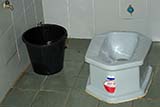 There's a fairly even mix of Western style and squat toilets in Thailand.
There's a fairly even mix of Western style and squat toilets in Thailand.
All tourist class hotels - and many apartment buildings - just have Western toilets. Older buildings and cheap guest houses will often have squat toilets.
Some places have a mixture, with different toilets in different cubicles, and sometimes there is a sign on the outside of the door to indicate what's inside.
From what I've read about the subject, squat toilets are healthier because the body is in a more natural position to evacuate the bowels. It is said that users of squat toilets have far fewer problems with haemorrhoids.
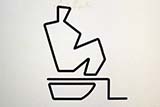 Because of what I have become used to over many years, squat toilets always seem a little strange. I avoid them when I can but there have been a couple of occasions when I've been caught short and the only available toilet was a squatting one.
Because of what I have become used to over many years, squat toilets always seem a little strange. I avoid them when I can but there have been a couple of occasions when I've been caught short and the only available toilet was a squatting one.
I've never worked out if they can be used without the need to completely remove one's trousers. Whenever I've had to use one, I have just stripped off from the waist down to avoid any accidents.
People who are used to squat toilets have the opposite problem. Apparently, they don't like sitting on Western toilets.
It isn't unknown to find a Western toilet with footprints on the seat where someone has been squatting on it. This practice is often frowned upon and some places display signs to warn people against doing this.
Toilet paper is fairly rare in Thai toilets, regardless of which type of toilet. There is normally a hose next to the toilet and this can be used to wash afterwards.
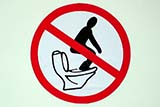 When you think about it, it's a lot more hygienic. If a bird deposited its dinner on my arm, I would want to wash myself with water. I wouldn't feel very clean if I just wiped the mess off with a piece of paper.
When you think about it, it's a lot more hygienic. If a bird deposited its dinner on my arm, I would want to wash myself with water. I wouldn't feel very clean if I just wiped the mess off with a piece of paper.
Where there isn't a hose there will be a bucket of water with a plastic bowl floating in it. This can be used for the same purpose.
Squat toilets don't normally flush (although I have seen flushing versions) and even with Western toilets in Thailand the flushing system isn't always plumbed in.
This is where the bucket and plastic bowl comes into use again. The bowl can be used to sloosh water into the toilet to flush away the contents.
Toilets can be quite basic in Thailand but most are kept quite clean so you don't have to worry too much. If you aren't familiar with toilets in Thailand, just be aware of the things above. If you need paper, remember to take your own.
Wednesday 17th March 2010
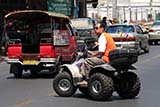 I talked recently about the enormous volume of vehicles using Thai roads that are actually illegal, but no one seems to care.
I talked recently about the enormous volume of vehicles using Thai roads that are actually illegal, but no one seems to care.
I also see quad bikes (ATVs) on the road fairly often. These are designed to be used offroad and in most countries it is illegal to use them on the road. I'm not exactly sure how the law stands in Thailand but I would imagine they are illegal.
I took this snap yesterday. (As with all the thumbnail images on this site, you can click on the small image to view a larger image - provided that you don't have Javascript disabled.)
The one in the photo has no licence plates (indicating it hasn't been registered), and no compulsory insurance disc (indicating it isn't insured). It's therefore illegal.
These things tip over very easily and there have been a few incidents where well-known people have been seriously injured on quad bikes.
Ozzy Osbourne ended up in intensive care after a quad bike accident, while Rik Mayall was technically dead for five days after a quad bike accident.
There are good reasons why laws exist to make them illegal, but in Thailand - as usual - it always seems that anything goes. In the 'Land of the Free' people can just please themselves.
Madness: Thai protesters carry blood to Thai PM Abhisit's house
I think that if I hear or read the word 'democracy' once more, I will vomit.
This protest isn't about the Western concept of democracy. It's about the Thai concept of patronage; and the rural poor attempting to get the patron of their choice by the only means they can think of.
They are justified with many of their grievances, but unfortunately they have been hoodwinked and they are completely misguided in how to put those grievances right.
Tuesday 16th March 2010
After reading about the red-shirts' latest blood protest, I've just wasted about two hours writing a summary of the current political situation in Thailand, the background to it, Thaksin's impact on Thai politics (which was massive), and how unique aspects of Thai culture and the interaction within (the many) different levels of Thai society mean that the style of Western democracy that has been imported into Thailand cannot work.
I then deleted everything because it will only upset people who don't understand the way Thais think, it won't do me any good, and it won't help to resolve the current situation.
What is going on is utterly futile and no matter which government runs the country, or how many protests people have, there is no quick solution to the huge rifts that now exist within Thai society.
Demanding a democratic society now, where everyone is 'equal', means completely altering the way Thai society - with its many different hierarchical levels and patron/client relationships - has always been run. It simply cannot be done overnight. The process can be started now but it will take many years to achieve (I would estimate at least two generations).
I think, deep down, the poorer members of Thai society know this but they are being stirred up to help with another person's selfish cause. They're just being used as pawns in an enormous struggle for money and power.
It's all very, very sad and at the moment I simply can't see how Thailand will resolve the current problems. Feelings are running very strong and neither side will back down. I can understand both sides' arguments but there isn't a quick solution.
All I know is that protesting wearing different coloured shirts, and collecting blood to be splashed around Bangkok isn't the way to fix problems that have existed for such a long time.
Thursday 11th March 2010
When I first came to live in Thailand the exchange rate was around Bt70. Within about six months it had climbed to almost Bt75. Those were the days.
In the second half of 2008 the rate went from above 60 to below 50. Since then, it has hovered around Bt50 but last month it took a turn for the worse.
In December 2009, my UK bank decided that their fee for overseas ATM transactions wasn't high enough so they increased it.
Last year, all the Thai banks with the exception of the Bank of Ayudhya, started charging Bt150 for ATM withdrawals from overseas bank accounts.
I normally draw Bt10,000 at a time. At one stage, this was costing me £137.92. The last transaction I made cost me £208.50 (around a 51% increase).
I am fed up with this. A short time ago I transferred some money from the UK. The charge for doing so worked out less than if I had drawn the same amount of money from ATMs. Fortunately, the rate at the time was quite a bit higher than it is now.
I have decided to stop using my UK bank account for the time being and will use my Thai bank account instead. I will let the money in my UK account accumulate and make another transfer when the exchange rate is better.
I know the UK economy is bad, but with all the political problems in Thailand (that are just about to get a lot worse) I can't believe how strong the Baht is against the pound.
I keep reading that the fear of a hung parliament in the UK is affecting the strength of the pound. A UK election is due before June this year and the British electorate need to make sure that Brown is put somewhere where he can no longer cause damage to the economy.
The rift between the red and yellow shirts in Thailand will only get worse, and eventually I suspect the political problems will hurt the Thai economy.
Only a few years ago, it was quite feasible for Brits with fairly limited means to move to Thailand and have a good life. If they owned a modest house worth, for example, £200,000 and sold it, they could get around 5% interest in a savings account.
That income, converted to Thai Baht using the exchange rate at that time, wouldn't have made anyone rich in Thailand but it would have been enough for a fairly comfortable lifestyle.
With interest rates falling to 0.5% and the collapse of the exchange rate, the situation has changed completely in a very short space of time.
As Buddhism tells us, nothing is permanent.
Tuesday 9th March 2010
I haven't been this excited about the end of a school year since I was 16.
I enjoy my job; I very much enjoy meeting the people I meet through work; the money is more than handy (especially now that the British pound has become a Mickey Mouse currency); the visa that comes with the job is worth a huge amount in saved expenses and hassle, but since I've been teaching full-time I have very little free time to do the things that I really want to do.
At the moment I am planning on doing one more year of teaching before hanging up my teacher's hat for good. However, the final decision will depend very much on what happens regarding the occupational pension that I am due to start receiving at the end of the year.
Had I reached 50 one year earlier, it wouldn't have been a problem, but this is the year the UK government has introduced new regulations regarding occupational pensions.
I have been assured by the company pensions department that the new regulations won't affect me, but until I get my first payment I'm not counting any chickens.
I have one more week of teaching commitments, and then I will get a long break. This last week will be quite intense, though, and I'm not sure that I will have much time to make any updates here.
If you use the RSS feed, I will continue to update it as I make changes so that you are notified automatically of any changes.
Monday 8th March 2010
Most e-mails I get from Thais are the usual boring chain e-mails that get circulated around the globe every day. They get deleted immediately. Occasionally, though, something good drops into my in-box.
I was sent one today which I think will be nostalgic to many Thais. It's pages from what looks like a standard text book designed for very young learners. Due to the fact it is being circulated in an e-mail, I guess that it is widely known in Thailand. However, I had never seen it before.
It starts off with a picture of a village and the names of the buildings, followed by an introduction of the characters who are children and animals.
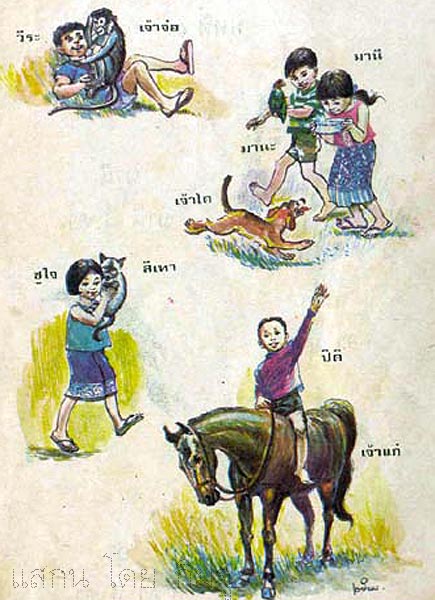
The text is extremely simple but it soon becomes evident that the book is about pronunciation, especially tones. I got quite excited when I saw this because my efforts so far to determine how Thais are taught to read and interpret tones have not been very successful.
Whenever I have spoken to Thais about how tone rules are taught to foreigners learning to read Thai, they look completely baffled.
I think I'm now beginning to understand why.
The book has many examples of words with the same sound but with different tones. Unless I've missed something, I can't see anything about rules. There is nothing about live and dead syllables, short and long vowels, consonant classes, tone marks; and how different combinations of these things result in a certain tone.
From what I can make out, everything is done purely by rote. Students repeat 'kao kao kao', 'soo soo soo', 'hor hor hor', 'nee nee nee', 'maa maa maa', 'roo roo roo', 'kum kum kum', etc etc., using the appropriate tone for each word.
The words are grouped in such a way that all words in a group use initial consonants of the same class. This means that the tone rules remain consistent for words in that group but there is no explicit mention of consonant classes.
It seems to be very much a case of teaching students how words sound, without teaching them any rules to explain why.
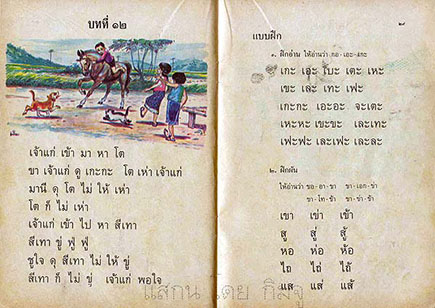
I imagine that all students would do this at the same time, along with the teacher. I do English pronunciation with my students sometimes and they seem to enjoy these drills where they repeat words in unison.
If I ask Thais about tones, instead of being able to explain the tone rules, they will simply start chanting just as they did when they were in primary school.
This is a very good example of the famous Thai rote learning system.
I don't actually have any problems with rote learning for certain things. Some information simply needs to be memorised and rote learning is an effective way of committing facts to memory. I remember learning 'times tables' by rote at a very young age.
The information is still there and unlike many kids today I don't need to use a calculator when performing simple mental arithmetic.
Learning to read Thai tones lends itself to learning by rote quite well, I guess. The only problem is that Thai students seem to get very attached to this way of learning and don't like any teaching methods that require them to think.
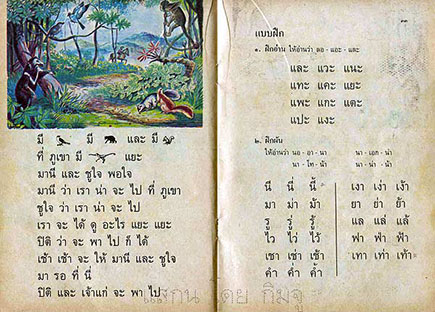
"Give a man a fish and you feed him for a day. Teach a man to fish and you feed him for a lifetime."
I have always thought that teaching students some basic rules and techniques would be more beneficial to them, but this hasn't worked very well in Thailand.
I used to teach staff at a hospital who had to deal with foreign patients. Some of them requested that I wrote down set phrases which they would then memorise and spout out parrot-fashion when a patient came in.
They didn't see anything wrong with this or realise how limited that method of 'teaching' would be. Their memory skills were actually excellent. I was amazed at the length of sentences they could memorise, and they could actually perform one page scripts from memory.
The only problem was that if there was any slight deviation from the original script, then they were completely lost.
I believe that there is still a place in education for rote learning, but the Thai education system really needs to focus on developing the students' ability to think.
The problem is that most of the teachers have only ever experienced the Thai education system, and therefore the only way of teaching they know is the way they were taught.
Saturday 6th March 2010
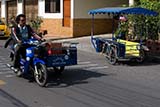 The application of law in Thailand is difficult to fathom out. There are laws for everything but they only seem to be enforced when there is a particular reason to enforce them. Otherwise, illegal activities are simply ignored.
The application of law in Thailand is difficult to fathom out. There are laws for everything but they only seem to be enforced when there is a particular reason to enforce them. Otherwise, illegal activities are simply ignored.
Everyone knew there would be repercussions after Thaksin's court judgement involving his loyal red-shirted supporters, most of whom are from poor rural areas of Thailand.
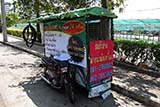 The farmers in these areas use their agricultural vehicles on the roads to get around. I know a foreigner who has been on motorbike trips in the northeast and he tells me the roads up there are full of strange-looking farm vehicles.
The farmers in these areas use their agricultural vehicles on the roads to get around. I know a foreigner who has been on motorbike trips in the northeast and he tells me the roads up there are full of strange-looking farm vehicles.
It is illegal to drive these vehicles on the roads but normally no one cares.
However, red-shirted supported were planning to drive down to Bangkok in their farm trucks to stage a protest. The government is now saying they will use traffic laws (which are normally ignored) to keep the farmers' vehicles off the road.
E-taen banned from roads : Suthep
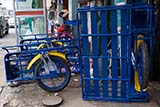 There are hundreds of thousands of motorbikes in Thailand that have sidecar contraptions of some description fitted. Specialist shops exist which build these sidecars to order.
There are hundreds of thousands of motorbikes in Thailand that have sidecar contraptions of some description fitted. Specialist shops exist which build these sidecars to order.
Sometimes they are used to carry extra passengers, and sometimes so that the owner can run a mobile business. Some owners build complete mobile shops and attach them to the sides of their motorbikes.
I was told recently that these too are illegal. I was amazed because there are just so many of them. They may be illegal but no action is taken against the owners.
If, on the other hand, protesters were planning to drive their motorbike sidecars to Bangkok I suspect that the law might suddenly be enforced.
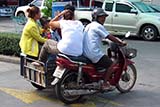 As a Westerner, I just find the whole concept of law in Thailand - and more specifically how it is applied in such a discriminatory fashion - very, very strange.
As a Westerner, I just find the whole concept of law in Thailand - and more specifically how it is applied in such a discriminatory fashion - very, very strange.
The Internet is awash with people trying to get information about visas in Thailand. The problem is that the immigration laws are applied in pretty much the same way as the traffic laws and therefore there are never any black and white answers.
I was talking to another foreigner living in Thailand who drives around on a big motorbike that wasn't produced in Thailand.
As I've mentioned before, any vehicle imported into Thailand is subject to a high import duty and therefore expensive. He paid about the same for his big bike as a 125cc Honda Wave. How come?
 The bike was imported from Japan in parts and assembled by a backstreet mechanic in Thailand. This way, no import duty was paid.
The bike was imported from Japan in parts and assembled by a backstreet mechanic in Thailand. This way, no import duty was paid.
What about registration? He told me that if he gets the bike officially registered he will have to pay the import duty, which would be about Bt80,000 (twice the amount he paid for the bike). He therefore hasn't bothered and rides around without any licence plates, which is illegal.
What if he gets stopped by the police? He told me the guy he bought the bike from has a friend who is a high-ranking policeman. If he gets stopped, he just makes a phone call and the problem will be dealt with.
This is how Thailand is; this is how Thailand has always been; and this is how Thailand probably always will be. I never realised this as a tourist but if you decide to make your Thailand home this is what you have to accept.
Friday 5th March 2010
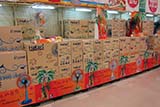 Who's the most popular farang in Thailand?
Who's the most popular farang in Thailand?
I've never met him but I think it's a bloke called Ron - I keep hearing his name wherever I go.
The heat continues to build day-by-day. The humidity is high and the leaves on the trees are almost stationary indicating that there is no breeze. I have resorted to air-conditioning and feel quite housebound at the moment.
I expect my electricity bill this month will be closer to Bt300 than the usual Bt100. I am desperate to do some photography but spending any length of time outside gets very uncomfortable very quickly at this time of year.
My teaching commitments for this school year have almost finished and pretty soon I will be getting a two month break. It's a fantastic opportunity to travel in Thailand but unfortunately my long break coincides with the hottest part of the year.
After avoiding the capital for almost four years, I am due a visit to Bangkok. I'd also like to visit some places I haven't been to in the north and maybe the northeast. However, these places are even hotter than the south during the hot season. It's a bit of a dilemma.
The photo reflects the current weather conditions. My local Tesco Lotus has just removed a large display of flatscreen LCD TVs and replaced them with an even larger display of fans.
Many Thais live without air-conditioning and have to rely on fans to keep them cool. The decision makers at Tesco are obviously planning on selling a lot of fans during the coming months.
ร้อน (ron = hot)
Thursday 4th March 2010
 I stumbled across a performance of Thai dancing yesterday. I'm not sure what it was in aid of but all the top local dignitaries were there, including the mayor. I think it might have been to officially open a newly renovated area of town.
I stumbled across a performance of Thai dancing yesterday. I'm not sure what it was in aid of but all the top local dignitaries were there, including the mayor. I think it might have been to officially open a newly renovated area of town.
Each region of Thailand has its own distinct culture. Culture in the northeast has been influenced by Laos. Culture in the south has a Malay influence, as well as an Indian one.
I know little about Thai classical dance and music but this style of dance is known as Manohra, based on an ancient fable.
 Manohra was a beautiful mythological half-bird/half-human creature known as a ginaree in Thai. As in all good fairy tales, she married a prince - Prince Suthon.
Manohra was a beautiful mythological half-bird/half-human creature known as a ginaree in Thai. As in all good fairy tales, she married a prince - Prince Suthon.
While her husband was away fighting wars, a jealous person foretold that she would bring tragic consequences to the prince and to the whole Kingdom. To prevent this, it was decided she would be put to death by burning.
Her last request was that she be allowed to wear her wings for her final dance, and with this she managed to escape by flying away.
The performers looked quite old all dressed up in Thai traditional costume but I spoke to a few of them and they were only M4 students, therefore 15 or 16.
A little while ago I would have missed getting these photos. For a long time I only had an SLR camera and because of its weight and bulk I only carried it around when I intentionally went out to take photos.
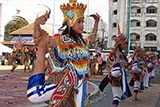 There were lots of times when I stumbled across something like this but didn't have my camera. I got fed up with missing photo opportunities so I bought a compact camera at the beginning of November.
There were lots of times when I stumbled across something like this but didn't have my camera. I got fed up with missing photo opportunities so I bought a compact camera at the beginning of November.
It looks the same as all the other compact cameras out there, but the sensor inside is bigger than most. This means that image quality is very good and it works well in low light conditions.
The camera is really small and light, and I carry it around with me all the time ... just in case. Considering how small it is, the image quality is excellent. It will never replace my SLR gear but I love the fact I can carry it around all day and not even realise it is there.
Last week I put together some more thoughts and a few sample photos: Canon PowerShot S90
If you're looking for a small, convenient camera for travel that is capable of very good results I would recommend this one highly.
Wednesday 3rd March 2010
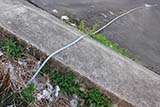 A few years ago I was teaching some mature students and one was complaining about a pain in his back. When I asked what happened he told me he had fallen from a lamppost.
A few years ago I was teaching some mature students and one was complaining about a pain in his back. When I asked what happened he told me he had fallen from a lamppost.
Naturally, I wanted to know more.
There is a large shanty town nearby, next to the railway tracks. It's within the town boundaries but not really looked after by the local municipality. For example, water and electricity aren't supplied.
My ex-student lives on the edge of this area and has set himself up as a utilities company. The local electricity company supplies electricity to his house, which he then distributes to the shanty town.
He has turned his house into a kind of electricity sub-station.
He employs a couple of workers to help him, and they install and maintain all the cables themselves. This is what he was doing when he had his accident. He does the same thing with water and has installed a network of blue PVC water pipes.
It's a lucrative business. His day job is government work, which is secure work in Thailand but pays a pittance. On the other hand, he earns something like ten times his government salary from his business on the side.
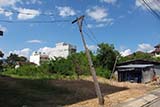 He was telling me that his monthly electricity bill is about Bt100,000 (mine is Bt100).
He was telling me that his monthly electricity bill is about Bt100,000 (mine is Bt100).
Due to the fact this is a special service he is able to charge his customers a higher rate than usual and I think his profit is about double his expenses.
The authorities must know what goes on but no one seems to be bothered. Good luck to him for spotting an opportunity and capitalising on it.
Elsewhere around town there are small, isolated shanty dwellings (plywood with corrugated iron roofs) which also aren't supplied with any electricity or water.
Whoever lives in the one in the photo has cut a channel in the road and laid a hosepipe. This is connected to a tap belonging to the house opposite and supplies water. Maybe he pays the owner of the house?
To get an electricity supply he has just strung up a couple of cables and connected these to the overhead cables in the street. There is no meter so presumably it's all free.
I like the way poor Thai people are helped like this, but when you see some of these sights - and hear some of the stories - it can all seem rather strange.
Tuesday 2nd March 2010
It's unfair to generalise but most Thais do think differently to most Westerners. When people are brought up in environments with very different value and belief systems, their way of thinking can't help but be different.
This starts to become very evident if you teach in Thailand.
In my early days of teaching, I once tried to play a dinner party game with some older students who were about to go to university. The game should have been within their capabilities but it was an abject failure.
The idea was that each student could be any historical figure from any period, and that they had to engage in conversation with the other dinner party guests. The ideas for guest selection, questions, and interesting conversation should have been endless.
Their first task was to select the guests, and this is where it all started to go wrong. I did my best to explain the idea but the only guests they could think of were Spiderman and a bunch of vacuous teenage pop singers from Thai and Korean boy/girl bands. Oh, well.
The dinner guests they suggested (apart from being fictional) probably didn't know any historical figures, and most likely couldn't ask an interesting question if their lives depended on it.
These were M6 students from supposedly the best school in town and quite a few were just about to go to some of Thailand's top universities.
I gave up in the end; put the whole episode down to experience; and now I don't give my students anything that requires any great deal of intellectual thought.
It's not that they are any less intelligent than kids from elsewhere, but they have a different set of priorities in life. The Thai education system doesn't help, either.
As one long-standing farang teacher told me, the education system is designed to get the students through exams. This is mostly done by memorising and then regurgitating things. A lot of teaching is done by rote and the system doesn't teach the kids to think.
Because it is such a boring way to learn, there is a bad association with books and learning. When the kids are out of school the last thing they want to do is pick up a book.
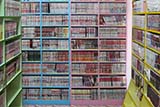 When asked, a few have told me that they read books over the weekend but further questioning reveals the 'books' were actually Japanese manga comics translated into Thai.
When asked, a few have told me that they read books over the weekend but further questioning reveals the 'books' were actually Japanese manga comics translated into Thai.
Thai kids love these comics but there is no educational value. They are so popular that there are shops which act like mini-libraries for comics. These shops (often located near schools) are full of thousands of comics that kids can rent for a few Baht.
They are also avid computer game players, and the boys love racing their motorbikes around the streets.
Last year I was doing an exercise from a text book about the environment. One of the questions was, "Do you think cars should be banned from city centres?"
I did this same exercise with quite a few classes and I was amazed that out of several hundred students not a single, solitary student said yes. Not one.
On the contrary, they looked shocked and quite disgusted at the thought of not being able to go into the city centre by car. A few actually got quite angry.
I wouldn't say that Thais don't care about the environment, but in their value system there are other things that are far more important.
Outward appearance, image, and perceived status are of the utmost importance to Thais; and cars in Thailand are the ultimate status symbol. Thais I have spoken to know the exact price of different cars and use this knowledge to judge people depending on the car they drive.
It will be a cold day in southern Thailand before a Thai gives up his/her car and takes public transport instead.
It would be interesting to compare how students think from different parts of the world. If they were given the task to come up with adjectives comparing bicycles and cars, which ones would they use?
Here are some suggestions:
Cars
Dirty
Polluting
Inefficient
Unhealthy
Unsustainable
Environmentally unfriendly
Bicycles
Clean
Non-polluting
Efficient
Healthy
Sustainable
Environmentally friendly
If you click on this link a window will pop up explaining how Thai kids think.
The Thais are lovely people and Thailand is a delightful place to spend a vacation, but after living there for a while you realise that the locals think on a completely different wavelength.


